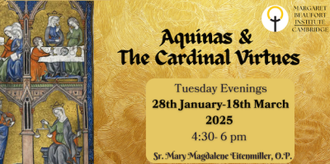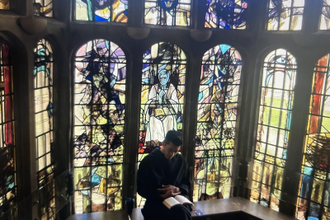Human flourishing in the best sense

One of the four Constitutions of Vatican II, Gaudium et Spes, describes the problems and questions that faced the world of the sixties, many of which problems persist today, sometimes to an even greater degree.
Among other things, the Council Fathers point to the "spiritual unease of today" (n. 5), and they add that the "new conditions also affect the living of religion (n.7)." In fact, "the imbalances affecting the world today," says the Council, "are … connected with a deeper imbalance rooted in the human heart where various elements are in opposition.
On the one hand, human beings as creatures experience considerable limitations, while on the other hand they are aware of being unlimited in their desires and of being summoned to a higher life. They are subject to many attractions and constantly compelled to choose between them and renounce some of them. They experience internal disunity within themselves, from which so many disharmonies in society also originate" (n. 10).
This situation may lead one to ask, what is the ultimate meaning or purpose of our existence? How do I attain that for which I exist? Do human beings necessarily have an end, a purpose, or reason for acting? St Thomas Aquinas answers "yes," there is an "end," or "purpose" with respect to all properly human actions, that is, all those actions "that proceed from a deliberate will" (ST I-II, q. 1, resp.). In other words, although there are actions that are not intentional, such as digestive processes or unintentional twitches, these are acts of a human being, but are not properly human acts, since they are not voluntary. It is necessary to distinguish between these involuntary acts and all voluntary acts, acts that are necessarily done for some reason, or intended end.
Now, St. Thomas, following Aristotle, states that this end for which I act attracts me, because I see it as a good or as having some aspect of goodness. And Aquinas believes that every human being does have a natural and necessary inclination to be happy. By 'happiness,' I do not mean a fluffy, everything-is-fine feeling, or a fleeting emotion. What I mean, and what Aquinas means is a true and lasting fulfillment of the human person, a real joy in finding the Perfect and Supreme Good that ultimately satisfies. However, this natural desire for the ultimate beatitude or happiness, manifests itself in our everyday lives in our little searchings for happiness, or fulfillment, in some way or other.
Now, the goal of the Christian life is union with God, which is our beatitude, our true and lasting happiness. In the course that I will be teaching on Aquinas and the Cardinal Virtues, we will learn about the cardinal virtues of Prudence, Justice, Fortitude, and Temperance (as well as about other related virtues grouped under these headings), which St. Thomas teaches are good habits that help us along our way toward our Lasting and Ultimate Good, union with God. We will also discuss how certain virtues are related to our living out of the natural law, and others help us to moderate our passions or desires. For Aquinas, the virtuous life is not about mere duty or obligation, nor is it a kind of stoicism. Rather, it is about human flourishing in the best sense, according to the way God made us and as the only way in which we can truly be fulfilled and happy forever.
Aquinas & The Cardinal Virtues, led by Sr Magdalene Eitenmiller, OP takes place on Tuesday evenings from 28 January @ 4.30pm to 18 March.
Join us for an inspiring online course exploring the timeless virtues of prudence, justice, fortitude, and temperance-principles that can guide and enrich our lives today. Last chance to subscribe-don't miss out!
To book tickets see: www.eventbrite.co.uk/e/aquinas-the-cardinal-virtues-tickets-1037795312717?aff=oddtdtcreator&mc_eid=6b45ba9acd&mc_cid=d25386dfef


















